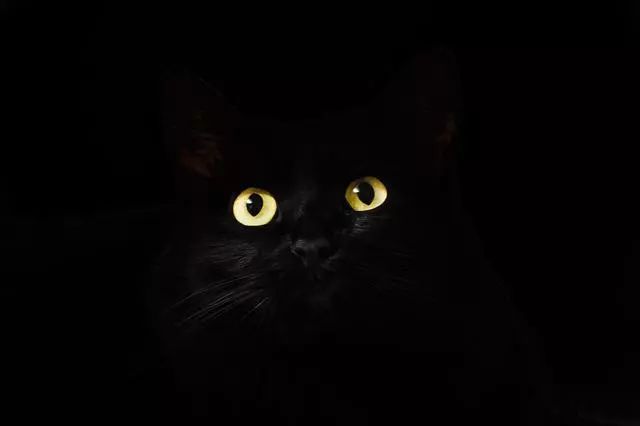Animals are deprived of not only their habitat but also their time.

When you squint and go to the bathroom in the dark in the middle of the night, and then stumble all the way back, your cat owner will stare at you with his glowing eyes: "Oh, blind man". Although human night vision is not as good as that of cats, we can barely see clearly in the dark. This is because our eyes have rod cells that sense dark light and help us stay active at night.
The shoveling officer is too weak! Picture: pixabay
Corresponding to the rod cells are the cones, the former is more sensitive to light and is mainly used for night vision, while the latter is mainly responsible for identifying colors and plays a more important role in the daytime. There are as many as 95% of the rod cells in our retina, which is more than the cone cells. But humans are mostly active during the day, why are there so many rod cells suitable for nocturnal activity in the eyes?
Dinosaurs made mammals go into the dark.
Mammals have more rod cells, perhaps because mammals were nocturnal in the distant past. As early as 1942, physiological optics and optometry expert Gordon Lynn Voles (Gordon Lynn Walls) put forward the "nocturnal bottleneck" (nocturnal bottleneck) hypothesis. According to this hypothesis, mammals used to choose to live nocturnal in order to avoid daytime dinosaurs, so today most mammals are still nocturnal. And even as we humans do during the day, there are still so many rod cells in our eyes.
Poor mammal. Picture: Ferahgo the Assassin / wikimedia
So, was it the extinction of dinosaurs that caused mammals to change from nocturnal to diurnal? Kate Jones of University College London believes that this is really difficult to determine because there is too little fossil evidence and it is difficult to infer animal behavior from fossils. However, Professor Jones's research found a close link between the disappearance of dinosaurs and the beginning of daytime activity in mammals. He also believes that primates, as the first mammals to adapt to daytime life, also have more time to evolve and adapt.
Imagine dinosaurs dominating the earth-going out in broad daylight is simply killing yourself and giving dinosaurs a free lunch. After the extinction of dinosaurs, mammals may no longer need to flinch in the dark. However, we are now forcing other animals to return to darkness.
I eat grass silently at night. Picture: pixabay
Humans show their heads, and animals walk at night.
A study published in the journal Science found that 62 species of animals spend less time during the day as a result of human activities. People have long found that the habitat of animals is constantly decreasing because of human influence, but now, unexpectedly, the time of animals has also been deprived by us.
Human activities with a high degree of interference, such as hunting, road construction, urbanization and so on, mostly take place in the daytime. Even seemingly mild activities such as hiking and watching wild animals can change animal habits. Overall, the animals' nocturnal activity time increased by an average of 1.36 times, although human activities had different effects on different species, the study found. The animals studied include elephants, moose and lemurs, not limited to their size, type of habitat, and whether they are carnivorous or vegetarian.
Coyotes, tigers and wild boars are affected by human mountaineering, farming and urbanization, respectively. Photo: Kaitlyn M. Gaynoret al. / Science (2018)
In the short term, this change in animals may be a cautious choice because it avoids head-on conflict with humans. However, when the animals that used to act mainly during the day move to the dark, their ability to find food and protect themselves will inevitably be greatly reduced.
In addition, some other animals may also lie down innocently: hyenas in California used to prey on birds, squirrels and other diurnal creatures, but now they spend more time sleeping during the day, and the species they eat have been replaced by nocturnal animals. Mice and rabbits say there is more pressure to survive. The researchers believe that more animals should be affected.
Human beings look high above us now, but don't forget the indelible marks on us that imply the humble identity that we used to live in the dark. Now, human beings do not need to do any violent acts of destruction to animals, as long as they show up, many animals will hide in the dark shivering.
Why do animals make it difficult for animals? (editor: Ent, plum, lava)
This article authorizes the transfer of self to the scientist iScientist.
I'm a scientist.
IScientist
Id: IamaScientist
"I'm a scientist. I'll do popular science."
Calendar Niang today's avatar
Dog family serval dog
This article was first published in the fruit shell network. I am a scientist iScientist.
- Prev

There is one more person who carries the pot for the poppy.
About July and August, the northern hills and meadows or the edge of the stone beach will bloom a lot of wild opium poppy (Papaver nudicaule), lovely yellow flowers are pitiful. The first blooming flowers, with their heads drooping, closed shyly, like a maiden.
- Next

Easy-to-feed flowers can bloom for a whole summer if they are often planted with some water when they are young.
Sunflowers, as their name implies, are flowers that open to the place where the sun shines. Seeing sunflowers is like seeing sunshine and hope, so the words of sunflowers are generally of positive significance. General florescence.
Related
- Wuhan Hospital Iron Tree Blooming Result Was Instantly Frightened by the Gardener Master
- Which variety of camellia is the most fragrant and best? Which one do you like best?
- What is the small blue coat, the breeding methods and matters needing attention of the succulent plant
- Dormancy time and maintenance management of succulent plants during dormancy
- Minas succulent how to raise, Minas succulent plant pictures
- What are the varieties of winter succulent plants
- How to raise succulent plants in twelve rolls? let's take a look at some experience of breeding twelve rolls.
- Attention should be paid to water control for succulent plants during dormant period (winter and summer)
- Watering experience of twelve rolls of succulent plants
- Techniques for fertilizing succulent plants. An article will let you know how to fertilize succulent plants.

